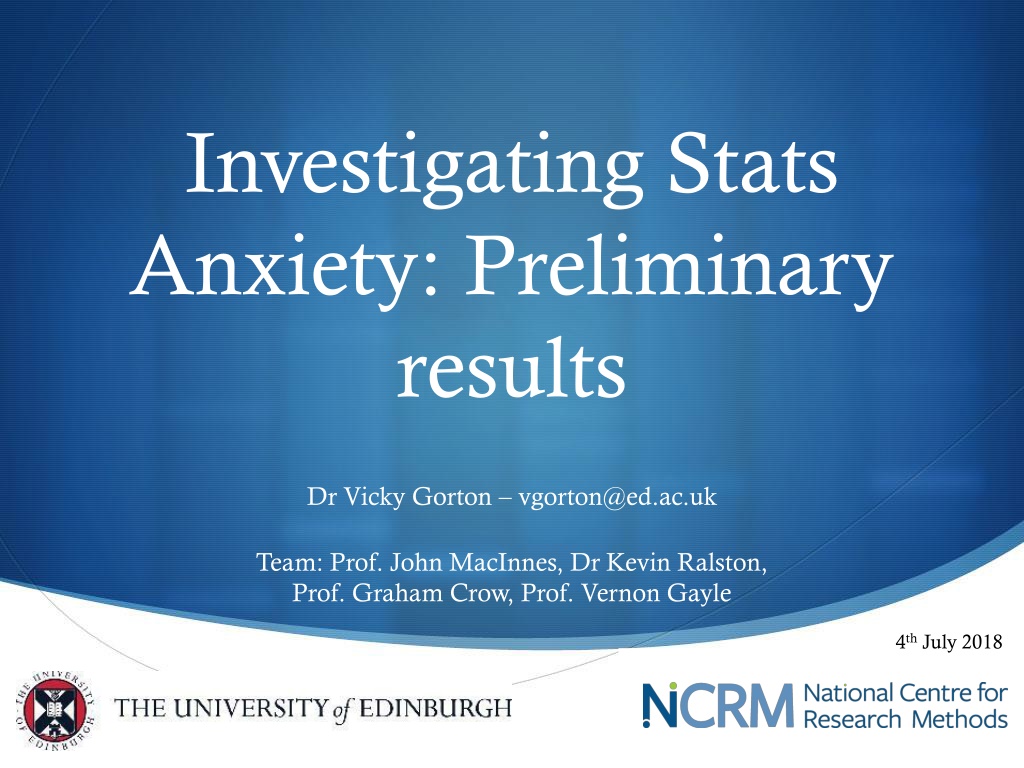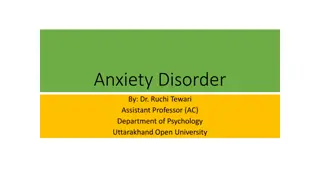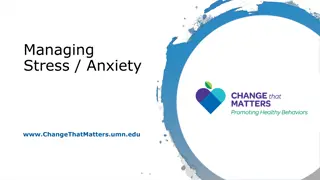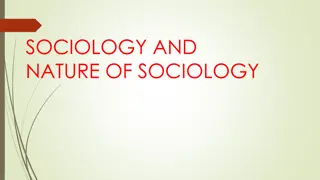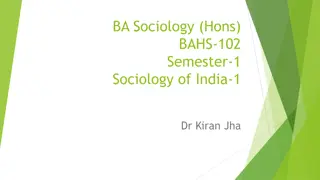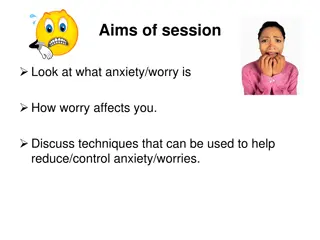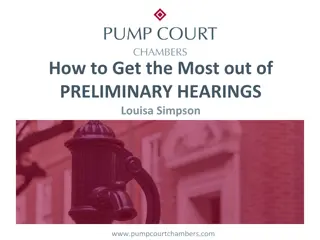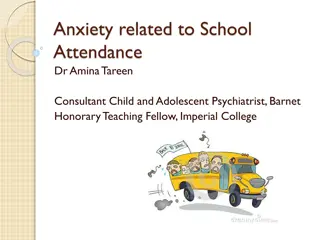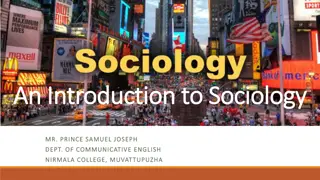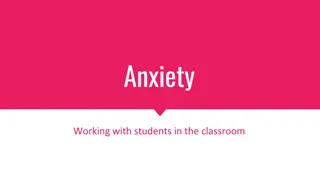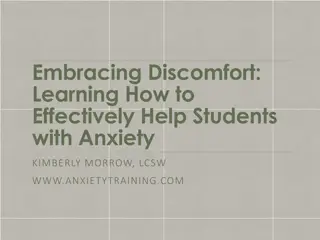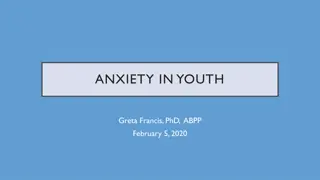Investigating Stats Anxiety: Preliminary Results on Sociology Students
The study conducted by Dr. Vicky Gorton and team examined stats anxiety among first-year Sociology students from Edinburgh and Lancaster University. They developed two questionnaires to assess anxiety levels and attitudes towards statistics among students. Findings revealed insights into students' perceptions of sociology, performance on math diagnostics, and associations with anxiety in learning statistics.
Download Presentation

Please find below an Image/Link to download the presentation.
The content on the website is provided AS IS for your information and personal use only. It may not be sold, licensed, or shared on other websites without obtaining consent from the author. Download presentation by click this link. If you encounter any issues during the download, it is possible that the publisher has removed the file from their server.
E N D
Presentation Transcript
Investigating Stats Anxiety: Preliminary results Dr Vicky Gorton vgorton@ed.ac.uk Team: Prof. John MacInnes, Dr Kevin Ralston, Prof. Graham Crow, Prof. Vernon Gayle 4th July 2018
Background Given the meta-analysis, we developed two new instruments: 1. Large-scale questionnaire, linking course performance with anxiety and other antecedent factors (ongoing, ~600). 2. Smaller-scale short questionnaire, investigating stats anxiety and trait anxiety, assessment attitudes, and general maths diagnostic.
Background Given meta-analysis, we developed two new instruments: 1. Large-scale questionnaire, linking course performance with anxiety and other antecedent factors (ongoing, ~600). 2. Smaller-scale short questionnaire, investigating anxiety and trait anxiety, assessment attitudes, and general maths diagnostic.
The Questionnaire Comprised of: - Background (i.e. gender, school location, most recent maths qualification, degree area). - Trait anxiety - Attitudes towards assessments/studying - Impression of Sociology as a subject - Attitudes towards statistics - Maths diagnostic (6 Qs)
The Students 1st years from Edinburgh and Lancaster University studying on Sociology modules in 2017 & 2018. N = 264, 85% Female 70% studying for degrees in Social Sciences, 28% Humanities, and 2% Natural Sciences. 23% had pass at A Level, 17% Higher pass, 29% GCSE or equivalent, 2% no maths qualification.
Findings Views on Sociology 1. Performance on Maths diagnostic 2. Associations with reporting anxiety about learning statistics. 3.
1. Views on Sociology Do you think Mean = 7.6, SD = 1.8 Sociology as a subject has less status than the natural sciences 62% agree Employers see sociology as a good degree 48% agree Sociology is considered a feminine subject 43% agree
2. Performance on Maths Diagnostic What is 5 out of 20 expressed as a percentage? 1. If you toss a fair coin twice, what are the changes of getting heads both times? 2. To get a total of 7 with a pair of dice, you need to throw 1 & 6, or 2 & 5, or 3 & 4. To get a total of 6 with a pair of dice, you need to throw 1 & 5, or 2 & 4, or 3 & 3. With two fair dice, would you expect to get: 7 more often than 6 6 more often than 7 6 and 7 equally often 3. Which of the following expressions is not equal to any of the other three? a-b+c (a-b)+c a-(b+c) 4. a+(c-b) 3x + 4 = 10. What is the value of X? 5. What is divided by 2/3? 6.
2. Performance on Maths Diagnostic What is 5 out of 20 expressed as a percentage? (A:25%) 85% students correct 1. If you toss a fair coin twice, what are the changes of getting heads both times? (A:25%) 32% correct answer 2. To get a total of 7 with a pair of dice, you need to throw 1 & 6, or 2 & 5, or 3 & 4. To get a total of 6 with a pair of dice, you need to throw 1 & 5, or 2 & 4, or 3 & 3. With two fair dice, would you expect to get: 7 more often than 6 9% students correct 3. Which of the following expressions is not equal to any of the other three? a-(b+c) 4. 36% correct 3x + 4 = 10. What is the value of X? (A: 2) 77% correct 5. What is divided by 2/3? (A: 9/8 or 1.125) 35% correct 6.
2. Performance on Maths Diagnostic 2 students scored 6/6. Mean = 2.9 right answers, (SD = 1.6). Scotland 3.3 2.7 2.1 1.7 Rest of UK 3.6 3.5 2.8 2.4 115 Rest of World 3.8 3.6 3.4 1.7 89 Other A Level pass A,B, C Higher pass A, B, C GCSE, O-level, Standard Pass N 52 Mean score on maths diagnostic by country and maths qualification Different education systems? Or cultural attitudes to authority/perseverance?
3. Associations with Stats Anxiety The idea of learning statistics makes me anxious Associations with gender (F), place of schooling (UK), maths qualification (GCSE), however some confounding, e.g. controlling for maths qualification or maths diagnostic score removes association with gender. Stats Anxiety Statistics Value* Number Phobia* Trait Anxiety Maths Diagnostic Score Risk Taking* Assessment Anxiety* Disagree -0.568 -0.623 14.2 3.45 -0.201 -0.417 Agree +0.431 +0.480 15.2 2.64 +0.149 +0.355 (mean scores, with all p<0.01 on T-test between two groups) *standardized measures Statistics value: Positive score indicates negative view of the usefulness of statistics. Number phobia: Positive score indicates greater resistance to number work
Logistic Regression One model outperformed them all with just two independent variables: scores on number phobia and value of statistics. Model fit/predictive power was not improved when adding maths diagnostic score and maths qualification p Beta S.E. Wald Exp(B) .875 .208 17.668 .000 2.398 Statistics value 1.155 .214 29.135 .000 3.173 Number Phobia .505 .168 9.005 .003 1.657 Constant
Conclusions Although, stats anxiety gave a simple associations with maths ability or qualification, the results of the logistic regression suggest that it may be attitudes to numbers and confidence with them, together with attitudes towards the value of statistics that are better predictors at least in term of expectations. Small study and work in progress we re still looking for other institutions to circulate both questionnaires at, if you re interested in getting involved email: John.MacInnes@ed.ac.uk
